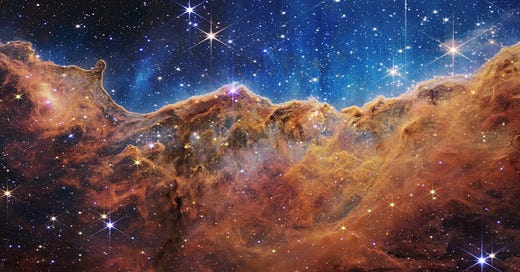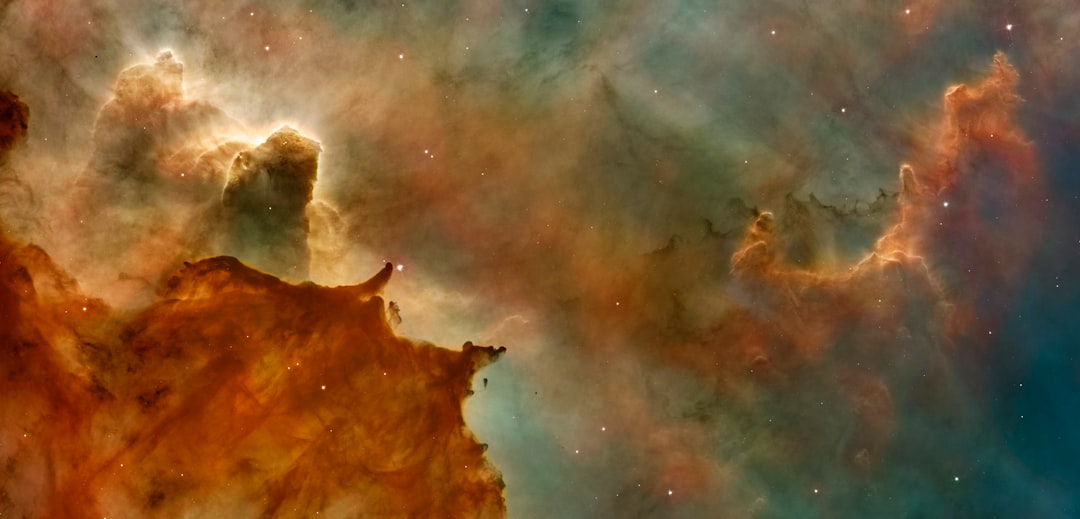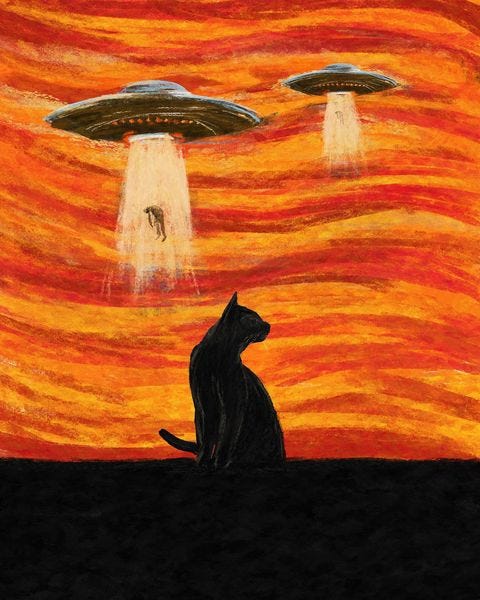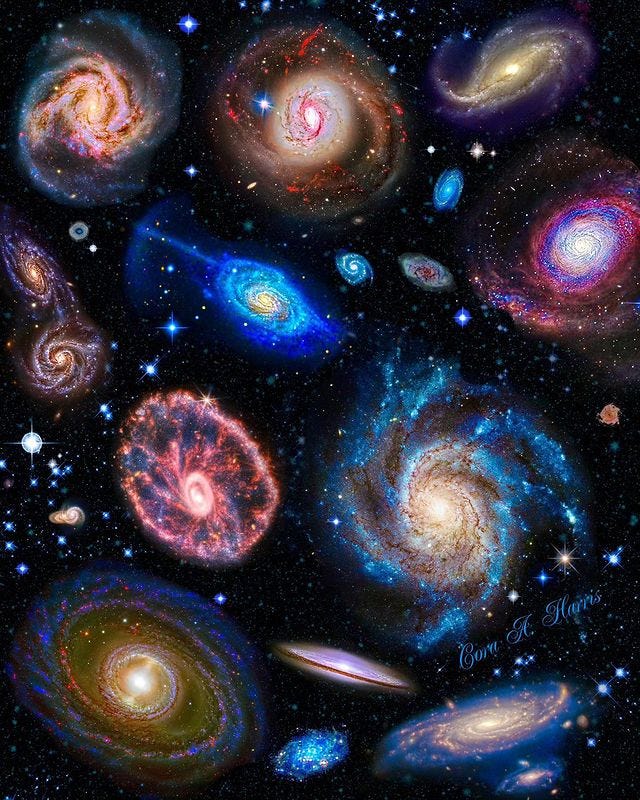Cosmic kinship: Decolonizing our understanding of extraterrestrial life
Unpacking theories on aliens to take a more open, hopeful approach to life itself
It’s a rainy, cloudy, beautiful day here. I look up at the sky and despite my initial doubts, I’m glad I’m sharing this with you. It was fun to write so I hope it’s a fun read.
This piece is about aliens… but it also sort off isn’t. It’s more about looking at mainstream societal narratives on extraterrestrial life to better understand the problems that come with approaching the world (or the universe) through a colonial lens.
Quick aside before I start: I am trying out a new offering for paid subscribers— a (monthly) Group Support Session! Sign up link at the bottom of this newsletter.

Alright, let’s get into it.
Are we the only “alive” beings in this universe? What else is out there among other star systems and galaxies? Since the beginning of time, humans have looked to the stars— some with reverence, gratitude, curiosity & imagination and some driven by the desire to “discover”, explore and eventually colonize space (labeled the “final frontier”).
I’ve always been fascinated by popular narratives on aliens— from the recent hype about the ex-pentagon whistleblower claiming that the U.S. government is covering up a multi-decade operation that recovered UFOs (unidentified flying objects) to alien abduction stories with strikingly similar narratives of humans being kidnapped/ abused/ experimented on… or mainstream media depictions that frame aliens as war-waging monsters that are out to colonize, exploit and/or annihilate us & our planet.

There’s also lots of things that are framed as “alien” to us, even right here on Earth. There’s a reason such othering terminology is used by the state to refer to migrants. But it doesn’t end there. In our day-to-day intimate lives, there’s new things that can feel alien to us like people with different beliefs, a web of reciprocal relationships (i.e. true community), culture, processing complex feelings, connecting with the land, understanding ourselves as part of a collective, etc. What we (intentionally or subconsciously) categorize as “alien” versus “familiar” depends on our individual reference point shaped by our experiences under these systems and the beliefs they ingrained within us.
We’re taught to approach the unknown, the unfamiliar or the different with more fear, paranoia, and animosity rather than openness, curiosity and care. It often prevents us from reaching the hope, love and joy that lies in unfamiliar places, paths or people. I’ve written before about how we conflate familiarity with safety which means even things that are good for us can feel initially feel “unsafe”:
We conflate familiarity with safety & it prevents our personal + political growth
Anything can be normalized if we are gradually eased into it. Anything that is completely ridiculous, violent, abusive, no matter how preposterous can become “normal” if… we are slowly and gradually exposed to it over time without experiencing any alternatives. It begins to define our reality and eventually prevents us from imagining possibilities outside the realm of what feels “familiar”.
Much of the dominant narratives on “how the world works” are shaped by flawed colonial assumptions that were originally fabricated to justify oppression. The idea that this is a dog-eat-dog world with scarce resources & inevitable competition, greed & violence are human nature, hierarchies & social constructs like race/ gender/ sex/ sexuality are natural…etc— I call these fallacies “colonial projections”. They can take a firm hold in our psyche and distort our perception of the world, thereby, influencing how we interact with it. That is where fear lives… and the more afraid people are, the easier they are to control, exploit & subjugate.
Colonial systems also tell us that even the deepest complexities of our universe can & must be quantified, measured & mechanically studied to be made comprehensible. Something is not considered “real” until it can be “proven” by colonial scientific metrics. Some pieces I recommend reading if you’re interested in more background:
Ultimately, living in constant fear of “the other” has serious consequences on our individual and collective health & happiness- whether it is a human, a non-human life form, a new idea or belief system or an unfamiliar way of being or feeling.
This piece is divided into two parts:
I start by picking apart dominant theories on aliens that shape the modern search for extraterrestrial life
Then using a decolonized lens, I dream up alternative hypotheses on extraterrestrial life that approach the cosmic unknown in a manner that could also help us build community & lead more liberating lives.
Unpacking dominant theories on alien life to take a more decolonized, hopeful approach to life itself
Colonialism laid the foundation for “modern” medicine & science (also called “settler science”), at the expense and erasure of more expansive, bold, collectivist, diverse, indigenous/ local knowledge systems. Space exploration and the modern search for extraterrestrial life are by design colonial projects riddled with the same imperialist fantasies, operating under the same flawed settler colonial logic. Nation states lead these billionaire-funded, militarized efforts that aim to abandon Earth once it is fully extracted from and expand their empires further into space to begin the next phase of intergalactic colonization. The worst of humanity essentially are in-charge of making “first contact” with alien “civilizations”. I (and many others) wonder how this will be any different than past & ongoing Earthly exploits, genocides and imperial invasions.
So the scientific community calls this field the Search for ExtraTerrestrial “Intelligence” (or the acronym SETI) which I find interesting since colonial projections decide what is or isn’t considered “intelligent life” (like the civilized versus uncivilized binary used to justify the colonization of Indigenous lands).
But let’s step back for a minute & have some fun unpacking the theories on extraterrestrial life that have emerged over the last few decades.
The search for “intelligent life” is itself a biased search— “Intelligent according to whom?”
An estimated >20% of planets in the Milky Way could support life. Even if we take these estimates with a grain of salt, I find it very hard to believe that we are exceptional or exceedingly rare in the vast, infinite expanse of the universe (maybe even multiverses?)
Despite deploying the most advanced observation techniques like telescopes to look for electromagnetic transmissions emanating from distant interstellar or intergalactic civilizations, modern settler led scientific efforts have been futile and so far found no convincing evidence of alien life has been found. But could it be that colonial scientific systems, undermined by their own biases, are fundamentally designed to fail? SETI efforts focus on one primary factor to detect “intelligent life”— technosignatures (traces or signs of technology akin to “modern” human technology). It mirrors the arrogance with which European colonial empires projected their own fears, insecurities & limited perceptions of the world onto everything “new” that they encountered.
Despite many Indigenous, land-based, collectivist communities harboring knowledge & innovation that continues to baffle settler states, colonial empires labeled them as “uncivilized”, inferior, savages that “deserved” to be colonized, enslaved and “civilized”. Why would such limited definitions of “intelligence” (that have failed to account for the diversity present here on Earth) be projected onto another cosmic species?
Collectivist/ Indigenous communities that find all life forms, including the planet itself, as sentient (without hierarchies) have successfully preserved the health & integrity of their ecosystems using ingenuity & creativity driven by no greater incentive than the desire to care. We don’t need other living beings to be fully comprehensible to us to be considered our kin. Plants, animals, microbes, and what many call “nature” (including the land, rocks, rivers, lakes, mountains, forests etc)… are all alive, emotional, aware, sentient and intelligent beyond measure or comprehension. I believe that similar beings and/or beings that we have yet to understand or beings we may never fully conceptualize… may be out there. This can collectively help us reconsider what we consider “life” on other planets and what we may categorize as “intelligent life”.
There may be many life forms that are vastly different from us in alternate, undetectable dimensions (something that modern science does not account for)— non-carbon based beings, beings that don’t use the laws of physics that we know, beings that don’t exist as “individuals” but as multitudes, beings whose physiological/ communal make up is wholly unfathomable to us. Regardless of if we find “evidence” of their existence, our cosmic kin deserve dignity. Believing in their sentience, complexity & agency can also help us build solidarity right here on Earth with beings who may seem different than us.
The Fermi Paradox- “If there is a high likelihood that extraterrestrial life exists in the universe then why have we not detected any evidence of it yet?”
The two big concepts shaping theoretical work in the field are the Fermi paradox and Drake equation.
The Fermi paradox is named after the lunchtime musings of a Nobel prize winning (settler) physicist. The Drake equation is where the high probability estimates for extraterrestrial life come from. This is essentially how the number crunching goes:
Given that our solar system is young (~4.5 billion years old) compared to the universe (~13.8 billion) & there are billions of stars (in the Milky Way alone) that are similar to our Sun, it is likely that some of them have Earth-like habitable planets that are home to “intelligent civilizations”—> given that these civilizations have likely existed & evolved for longer than us, they likely already developed technology for interstellar travel. Even given the slowest pace of hypothetical travel, the Milky Way galaxy could be traversed in a few million years… so why haven’t we interacted with them yet? That’s the question the paradox is stuck on. And many theories or hypotheses have emerged in the field to respond to it.
The main problem, however, is that the Fermi Paradox (& associated theories) hinges on one major assumption- that all civilizations will act like imperial/ colonial empires. It operates on these assumptions: 1) all “intelligent” exo-civilizations have an ingrained, innate, “natural drive” to colonize other star systems to expand the reach of their civilization and 2) every “advanced” cosmic civilization will inevitably run out of resources on their home planet as their technology advances and need to extract resources from other planets. Furthermore, the Fermi paradox assumes that all cosmic civilizations will eventually have to compete to survive because the universe only has “finite” resources— “colonize or be colonized”. Does this ring any bells?
An alternative, collectivist, decolonized, more hope-igniting framing:
Even right here on Earth, across history, many communities have not been driven by the urge to subjugate, exploit & dominate others so why would we presume that “all civilizations” harbor this desire?
The concept of scarcity itself is fabricated by capitalism which seeks to extract the most while putting in the least to maximize profits for a few. That is why our planet is being destroyed— not because we have a “finite” amount of resources that will eventually run out. There is an abundance of resources to support life on this planet. The problem is that they are being hoarded by a few at the expense of the majority.
These renowned physicists failed to account for a simple principle that indigenous, collectivist communities have operated on for eons—
Keep reading with a 7-day free trial
Subscribe to Cosmic Anarchy to keep reading this post and get 7 days of free access to the full post archives.










